Monterey Conversations
The Monterey Conversations are an exploration of topics related to Russia, to U.S.-Russian relations and to the post-Soviet world.
They go in-depth into the key questions of our moment and range from the war in Ukraine to political economy and to culture. Invited guests are policy-makers, area experts, scholars and journalists—coming from a variety of different countries and representing many different points of view.
At a time of crisis, these conversations capture the most important debates taking place in the United States, in Europe and around the globe. See the links to forthcoming and past events below.
Recordings of Past Monterey Conversations
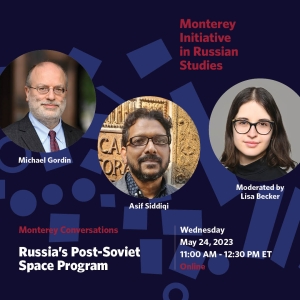
Russia’s Post-Soviet Space Program
In this Monterey Conversation, two leading scholars of the Soviet and post-Soviet space programs, Michael Gordin and Asif Siddiqi, addressed the effects of the USSR’s disintegration on the Soviet space program; the ways in which this program was handled by the Russian Federation in the 1990s; and the place of the Russian space program in cooperation and competition with the United States. The Monterey Conversation participants also discussed the current status of the Russian space program. This Monterey Conversation was moderated by Lisa Becker, an alumna of the Monterey Summer Symposium on Russia 2020. Watch the recording of this Monterey Conversation.
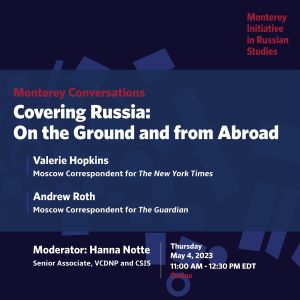
Covering Russia - On the Ground and from Abroad
In this Monterey conversation, two distinguished journalists, Valerie Hopkins (The New York Times) and Andrew Roth (The Guardian) addressed the task of reporting on Russia when it was very difficult for Western journalists to work there. Valerie Hopkins and Andrew Roth discussed such issues as access to information and described the kinds of stories that could be written and the kinds of stories that were not getting written. This Monterey Conversation was moderated by Hanna Notte. Watch the recording of this Monterey Conversation.
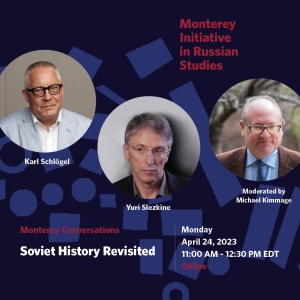
Soviet History Revisited
In this Monterey Conversation, two distinguished scholars of Soviet history, Karl Schlögel (Frankfurt an der Oder emeritus) and Yuri Slezkine (UC Berkeley), reviewed the long sweep of Soviet history, from 1917 to 1991. They addressed a multiplicity of questions. What are the best ways to frame Soviet history? Should it be written as the history of ideology, of high politics, of ideas, of foreign policy, of everyday life? And how linear is Soviet history? Was the end apparent in the beginning? Or are there ways in which Soviet history should be seen as non-linear or cyclical? And what archives are available for the conceptualization of Soviet history and its stories? This discussion was moderated by Michael Kimmage (Catholic University). Watch the recording of this Monterey Conversation.
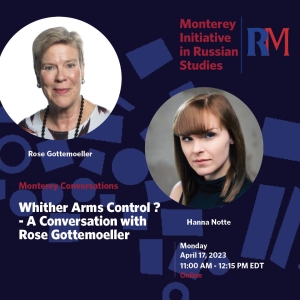
Whither Arms Control? A conversation with Rose Gottemoeller
This Monterey Conversation is with one of the world’s leading arms control experts, Rose Gottemoeller, who has served as Deputy Secretary General of NATO and as Under Secretary of State for Arms Control and International Security at the U.S. Department of State. In conversation with Hanna Notte, Rose Gottemoeller reflected on her experience in negotiating arms control agreements between Russia and the United States, discussed the current impasse over the New START Treaty and other arms control instruments, and offered her thoughts on how arms control may be handled in the future. This Monterey Conversation was co-hosted with Russia Matters. Watch the recording of this Monterey Conversation.
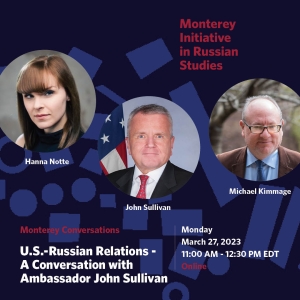
U.S.-Russian Relations - A Conversation with Ambassador John Sullivan
This Monterey Conversation is with Ambassador John Sullivan, who served as U.S. Ambassador to Russia from 2020 to 2022. In conversation with Hanna Notte and Michael Kimmage, Ambassador Sullivan drew on his diplomatic experience to address the lead-up to Russia’s invasion of Ukraine, the course of the war and the overall drift of U.S.-Russian relations. He offered his thoughts on the kind of diplomatic contact that still exists between Russia and the United States and how it could be put to practical use in the future. Watch the recording of this Monterey Conversation.
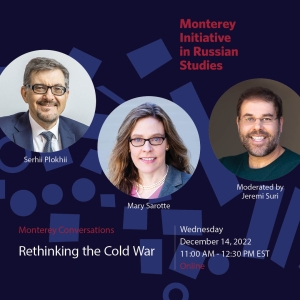
Rethinking the Cold War
The present often modifies the past. For a few areas of historical inquiry, this is as true as for the history of the Cold War. In this Monterey Conversation, Serhii Plokhii (Harvard University) and Mary Sarotte (Johns Hopkins SAIS) discussed the connection between the Cold War and the war in Ukraine, focusing on the history of Ukraine and on the history of U.S.-Russian/U.S.-Soviet relations. They focused on the ways in which this conflict is embedded in the history of the Cold War, and how this conflict may cause us to think differently about the Cold War. This conversation is moderated by Jeremi Suri (University of Texas at Austin). Watch the recording of this Monterey Conversation.
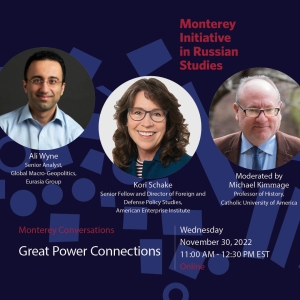
Great Power Connections
In this Monterey Conversation, moderated by Michael Kimmage, Ali Wyne (Eurasia Group), who is the author of a recent book, America’s Great-Power Opportunity and Kori Schake (American Enterprise Institute) contrasted great-power opportunities to the prospect of great-power competition and related these theoretical debates to the triad of the United States, Russia and China. What is a great power? Where among the great powers do the opportunities lie? And where do the dangers lie? Watch the recording of this Monterey Conversation.
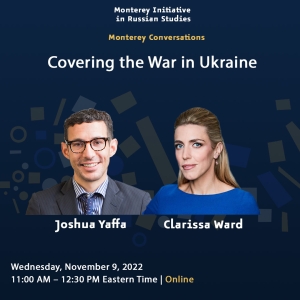
Covering the War in Ukraine
News coverage has been a crucial element of every modern war. In this Monterey Conversation, two distinguished journalists - CNN’s Clarissa Ward and the New Yorker’s Joshua Yaffa - addressed the challenges of covering the war in Ukraine. They discussed the complexities of gathering accurate information, the role of social media in the prosecution and coverage of the war and the balance between the war’s many local realities on the one hand and its global impact on the other. They took up the achievements of journalists covering the war, while also reflecting on where journalists and journalism have fallen short. Watch the recording of this Monterey Conversation.
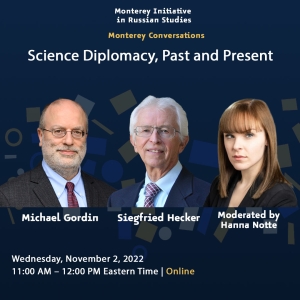
Science Diplomacy, Past and Present
In this conversation, moderated by Hanna Notte, Professor Michael Gordin and Professor Siegfried Hecker discussed the role of modern physical sciences in the U.S.-Soviet and U.S.-Russian relationship: What collaboration between scientists from both countries exist historically? Were there instances in which such collaboration had a positive impact on policy, and what can be learned from them for the future? And why and how does science diplomacy matter more generally? Watch the recording of this Monterey Conversation.
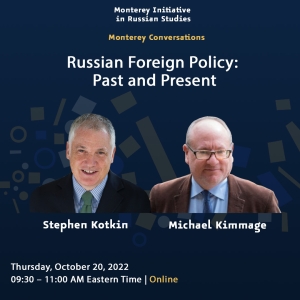
Russian Foreign Policy: Past and Present
In the May/June issue of Foreign Affairs, the historian Stephen Kotkin published an essay titled “The Cold War Never Ended.” In this conversation, moderated by Michael Kimmage, Professor Kotkin discussed the history of the Cold War, the thirty-year period between the collapse of the Soviet Union and Russia’s February 2022 invasion of Ukraine and the unfinished nature of the Cold War contest that began in the 1940s. Professor Kotkin brought historical examples and precedents to bear on causes of the current war. Kleinheinz Senior Fellow at the Hoover Institution, Professor Kotkin is the author of many books on Soviet and post-Soviet history. He also writes frequently on international affairs in the present tense. Watch the recording of this Monterey Conversation.
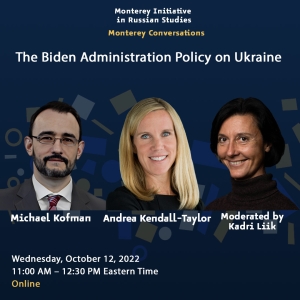
The Biden Administration Policy on Ukraine
The United States has been a key factor in the war launched by Russia’s invasion of Ukraine on February 24, 2022. This panel on the Biden administration strategies and decision making takes up three questions in turn. What was the Biden administration policy before the war? In what ways has the Biden administration policy shaped outcomes in the war? And what end state for the war is the Biden administration trying to achieve? This panel features three leading experts on Western policy toward Russia and Ukraine: Andrea Kendall-Taylor of the Center for a New American Century; Michael Kofman of the Center for Naval Analysis; and Kadri Liik of the European Council on Foreign Relations. Watch the recording of this Monterey Conversation.
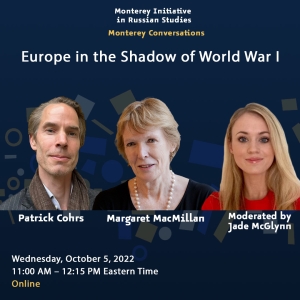
Europe in the Shadow of World War I
Europe is facing unprecedented turbulence. This installment of the Monterey Conversations is not forcing any analogies between past and present. Instead, it takes up the subject of the First World War with an eye to its present-day salience. What might the origins of World War I tell us about the nature of conflict in Europe? How did the First World War become a world war in the first place? How did it radiate out from the assassination of Archduke Ferdinand? And how did World War I end - on the battlefield and at the diplomatic tables? What can we learn today from the elusiveness of order and the recurrence of disorder in Europe since 1914? To take up these questions we have two remarkable scholars, Margaret MacMillan, author of Paris 1919: Six Months that Changed the World and The War that Ended Peace; and Patrick Cohrs, author of The New Atlantic Order: The Transformation of International Politics, 1860-1933. Watch the recording of this Monterey Conversation.
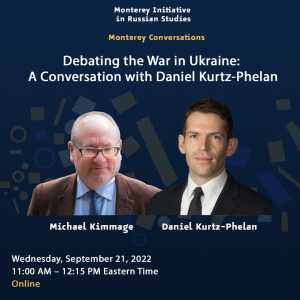
Debating the War in Ukraine: A Conversation with Daniel Kurtz-Phelan
Historically, Foreign Affairs magazine has published some of the most important writing on Russia, the Soviet Union and the post-Soviet space, going back to George Kennan’s legendary “X” article of 1947. In this conversation, Michael Kimmage and Daniel Kurtz-Phelan (Editor of Foreign Affairs) discussed the origins of the war in Ukraine, the global ramifications of this war and the choices faced by the Biden administration. It also took a close look at the policy debate over which Foreign Affairs has presided since February. What is the spectrum of opinion? And what is the relationship between policy prescription and the analysis of a rapidly unfolding situation on the ground? Watch the recording of this Monterey Conversation.
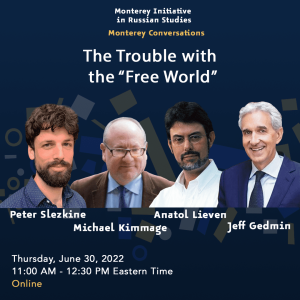
The Trouble with the “Free World”
This is a conversation about the notion of the free world, stemming from a May 6, 2022 Foreign Affairs article published by Peter Slezkine (East China Normal University). In this article, Slezkine argues that the Cold War idea of the free world maps only inaccurately onto the current war in Ukraine. Joining him to debate this idea are Anatol Lieven (Quincy Institute for Responsible Statecraft) and Jeffrey Gedmin (American Purpose), who offer their perspectives on the proper connections between the Cold War past and the 21st-century present, asking not just about the trouble with the “free world” but whether the free world is itself in trouble or whether it is once again salient and ascendant. Watch the recording of this Monterey Conversation.
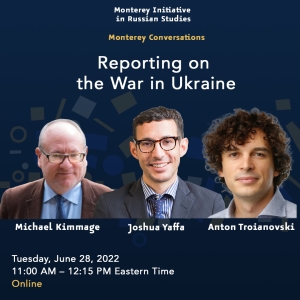
Reporting on the War in Ukraine
This conversation took up the work of two leading English-language journalists, Joshua Yaffa (The New Yorker) and Anton Troianovski (The New York Times), both of whom are covering the war in Ukraine. At issue were the challenges of covering this war, the difficulties of writing about Russia when so many non-Russian journalists have either left the country or been expelled and the uses and abuses of information in this first major twenty-first century war. Watch the recording of this Monterey Conversation.
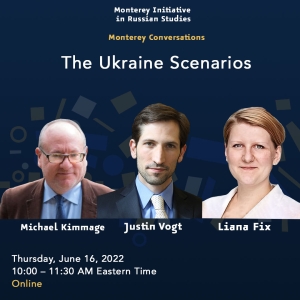
The Ukraine Scenarios
Since the start of Russia’s war in Ukraine, many predictions about the course of the war have been put into question. In this Monterey Conversation, Michael Kimmage and Liana Fix discussed with Justin Vogt the multiple pathways of this war - and the consequences for U.S. and European security if the war doesn’t end. Watch the recording of this Monterey Conversation.
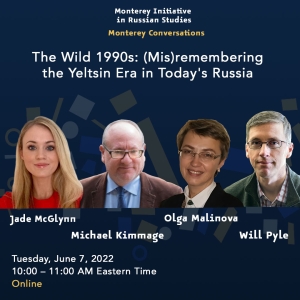
The Wild 1990s: (Mis)remembering the Yeltsin Era in Today’s Russia
In this Monterey Conversation, Michael Kimmage, Olga Malinova, Will Pyle and Jade McGlynn examined the politicized memory of the 1990s and its role in shaping Russian society, attitudes towards the West, and sense of national humiliation. They contrasted this with the economic reality of that era, outlining how the turbulence was used to fuel a sense of grievance and considered where memory and history diverge and how political uses of the 1990s are changing against the backdrop of Russia’s war on Ukraine. Watch the recording of this Monterey Conversation.
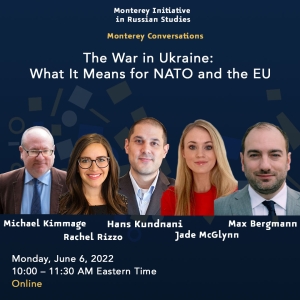
The War in Ukraine: What It Means for NATO and the EU
For this Monterey Conversation, Michael Kimmage, Max Bergmann, Hans Kundnani, Jade McGlynn and Rachel Rizzo explored the many European reverberations of the Russian invasion of Ukraine in February 2022. This panel assessed the war itself as a threat to European security and the challenge the war presents to NATO and the EU as well as the long-term opportunities that may result from this terrible war. Watch the recording of this Monterey Conversation.
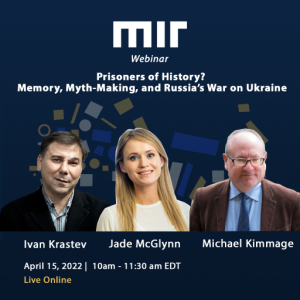
Prisoners of History? Memory, Myth-Making, and Russia’s War on Ukraine
On April 15, 2022, Ivan Krastev, Jade McGlynn, and Michael Kimmage discussed the role of historical myths in justifying Russia’s invasion of Ukraine as well as how the systemic flaws of the authoritarian power vertical in Russia contributed to masking reality and the extent to which analysts overlooked the role of emotion and messianism in Russian decision-making. Watch the recording of this Monterey Conversation.
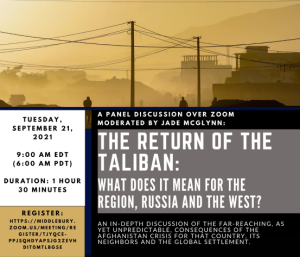
The Return of the Taliban: What Does it Mean for the Region, Russia, and the West?
On September 21, 2021, Elena Chernenko, Anatol Lieven, Rakesh Sood, and Clarissa Ward discussed the far-reaching consequences of the Afghanistan crisis. Watch the recording of this Monterey Conversation.
